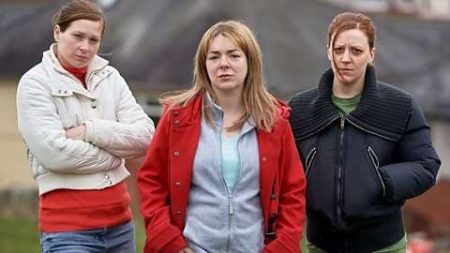It is the end of May, and we are coming to the end, I assume, of the high-budget, ‘quality’, event-TV dramas that follow the blockbuster repeat series of the winter months. In Britain, this meant that we got to see a lot of dramas that were usually based on real crime cases. Whilst such a focus on real crime for these event-television dramas is worthy of discussion in itself, what I want to focus on here is how these dramas have finally found a way to bring an interesting representation of working-class life onto British screens. Such a representation is long overdue and addresses the realities of working-class life in a particular way.
The dramas I am talking about include the two BBC dramas The Moorside (2017) and Three Girls (2017) and the ITV dramas Little Boy Blue (2017) and In Plain Sight (2016). The Moorside was based on the case of the disappearance of 9-year old Shannon Matthews who was later discovered at the house of the uncle of her mother’s boyfriend while Three Girls dramatises the story of the Rochdale child sex abuse ring. Little Boy Blue focused on the shooting of Rhys Jones, the 11-year-old boy who was caught in a gang shooting in Liverpool. Finally, In Plain Sight dealt with the historic case of Peter Manuel, a serial killer, portrayed brilliantly by Martin Compston, in Lanarkshire, Scotland.
Now, I can hear you say, these dramas are certainly not the only ones currently providing representations, and sympathetic ones at that, of the working classes. This week, after all, saw the beginning of Broken, Jimmy McGovern’s new drama. And there remain the key soap operas, Coronation Street and EastEnders, both of which continue to focus on community spirit and the lives of ordinary, working-class Brits. In addition, we can look forward to the return of Happy Valley (BBC2, since 2014).
True.
Jimmy McGovern’s drama sits in the distinguished tradition of British social realist drama that was introduced to British TV audiences via the BBC’s The Wednesday Play, and in particular Ken Loach’s contributions with Up the Junction (1965) and Cathy Come Home (1966). This tradition continued with such seminal work as The Spongers (part of Play for Today, BBC1, 1978) and Boys from the Blackstuff (BBC2, 1982, for a discussion of social realism and British television drama, please see Cooke). As so many of these, Broken emphasises the despair and destitution of working-class people in crisis. This crisis is primarily based on their status as working-class: stuck in employment that is often casual or vulnerable to changes in the market/the worker’s life, they show how cuts to the safety net of the welfare state impact on people’s lives. Most of them end up doing something desperate, and it is this act that creates the highest emotional effect for the viewer. Who could forget the dreadful scene when Cathy camps out in the station only for the social services to find her and take her children away? Or the cries of ‘Not the children, not the children’ at the end of The Spongers? The point of these dramas is clear: they are meant to make us feel the dreadful despair of these people and as a result become politically active in some way or other.
This is very different from the real crime dramas that have recently populated the schedules of the two mainstream broadcasters. Here, the crisis is not coming because of the protagonists’ class status, but rather as a result of a crime being committed. In The Moorside, perhaps, the crime is the desperate act committed by someone who is struggling with the financial pressures of their lives. However, it is never portrayed as such. Rather, the drama focuses on the coming together of a community. Told through the eyes of Julie Bushby (Sheridan Smith) who organises much of the events and manages to unite what is otherwise a rather disparate, and sometimes hostile group of people, the drama provides us with what remains a unique perspective on British television: namely that of a working-class woman. All too often, stories of working-class women remain mediated through the eyes of either non-working-class people or men. In The Moorside, we see a number of single mothers at the core of the story, and most importantly, their perspective is the one that counts.
This is similar in the other dramas, although they offer multiple perspectives, some of which are those of men. However, in all of them, the women’s narrative voices remain central. In Little Boy Blue, much of the story, including our initial introduction to Rhys’s murder, is mediated through Melanie Jones’s (Sinead Keenan) point of view. She remains central to the narrative throughout, and her grief and depression is a central emotional anchor for the viewer. Three Girls starts the story with Holly’s (Molly Windsor) point of view and often returns to it. In Plain Sight is the drama with the least obvious female point of view – though one victim is provided with some narrative agency.
The working-class women’s perspective is certainly one of the reasons why these dramas stand out for me as far as the representation of the working class is concerned. All of these programmes afford significant space to the women’s lives in relation to the crime, the community they are part of and the emotional impact events have on them. They allow the women to emerge as complex, believable characters, and not just stock figures of the mother, the girl-friend, etc. In addition, these dramas seem to emphasise that it is the women who carry most of the burden of the experience of trauma, and by doing so point to the shifting configuration of gender relations in the poorest demographics of our society: the working-class poor are, thanks to austerity, increasingly female.
However, rather than emphasise the role of austerity to the lives of these women, these dramas represent their lives, how they cope, what they do, and how they operate outside of normal, middle-class society. The Moorside and Three Girls were particularly strong at emphasising this: these women exist outside of the safety net that is ‘normal’ society, and it is for these reasons, that the things these dramas portray happen. The women are normally overlooked, or even ostracised. But they still cope, somehow.
So why do I experience this as so positive, particularly in comparison to Broken (to which I was completely glued as well, though) and its predecessors? The reasons are simple: this is the life that I observe on a daily basis, and it is good to see it represented. Liverpool is full of women who are working-class and increasingly pressed for money. But they cope. They are not (yet) pushed to desperate measures. And this is as important to see as the stories of those who are. In other words, we need a mix of representations of working-class life. And the real crime dramas that have recently been on our screens offer one kind of portrayal that has been missing. They aren’t perfect – they distinctly lack perspectives of non-white women, for example – but they are a useful addition.
Elke Weissmann is Reader in Film and Television at Edge Hill University. She is currently considering changing this to Reader in Television and Film, however. Her books include Transnational Television Drama (Palgrave) and the edited collection Renewing Feminisms (I.B.Tauris) with Helen Thornham. She sits on the board of editors for Critical Studies in Television. She migrated to the UK in 2002 after realising that German television was as bad as she remembered.




